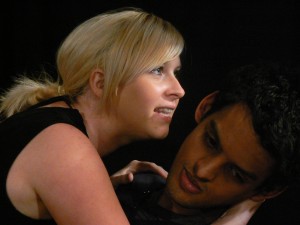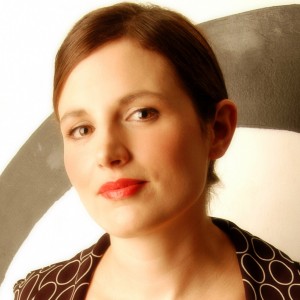Sarah Grochala is an award-winning playwright and one to watch out for. After initial success as an actress, Grochala turned her talents to writing and penned the Edinburgh hit Waiting for Romeo which later transferred to London's Pleasance Theatre.

Her latest offering is a play inspired by the events at the notorious S-21 prison in Cambodia and by the work of the photographer Nhem En, a young soldier responsible for taking the ID photos of thousands of people before they were tortured and killed by the Khmer Rouge. Grochala draws on prison records and interviews with both prisoners and Khmer Rouge cadres to create a startling and affecting drama. S-21 stars Eastenders actress Brooke Kinsella (above).
The Drama Student catches up with Sarah on the run up to its opening at the Finborough Theatre next Tuesday for a month long run.

What can we expect from your new play, S27?
The play is about a woman who takes photographs of people before they are executed. It was inspired by photographs from the notorious Tuol Sleng prison in Cambodia, where around 14,000 people were killed during the Khmer Rouge era. It's quite a dark piece, but the audiences so far have found it an engaging and affecting experience.
Do they believe in the aims of the regimes they serve or are they just afraid for their own lives?
What was it about the photographer Nhem En's work that inspired you to write this play?
The fact that it was his work, not in the artistic sense but literally. This was what he did every day. He got up in the morning and went to work like the rest of us, except that his work was taking photographs of people who he knew were on their way to certain death. I've always been fascinated with the small people within a repressive regime. The people whose jobs seem quite insignificant in themselves but yet without whom the regime couldn't function. Another good example would be the people who drove the trains to Auschwitz. Who are these people? Do they believe in the aims of the regimes they serve or are they just afraid for their own lives? To what extent can they be considered as the perpetrators of the crimes they are involved in and to what extent could they also be seen as victims?
I was also very much drawn to the people in the photographs themselves. When you look at the photographs on mass you get a terrifying idea of the sheer number of people that the Khmer Rouge killed, however the individual disappears. If you spend more time with the photographs you begin to get a sense of the individual caught up in larger events. You become aware of each person's unique reaction to the situation they have found themselves in. Some people seem afraid, others resigned. Some people look angry, while many seem unaware. What are they thinking? How much do they know about what is about to happen to them? Then when you put the photographs alongside prisoners' confessions or other accounts of what happened in Tuol Sleng, you really start to get a strong picture of the individual people behind the statistics.
I think there is great value in being able to see the world from different viewpoints
Why do you think other cultures interest you so much?
One side of my family are Polish, and so like many people in Britain I've grown up split across two cultures. I think there is great value in being able to see the world from different viewpoints, as it means that you don't take any one particular point of view as the gospel truth. By looking at our culture through the eyes of other cultures, I think it makes it easier to see where the strengths and weaknesses in our own way of living lie.
Why do you think theatre is so powerful when highlighting Human Rights issues?
I think theatre can be great tool for raising awareness. A play can portray the story of an individual character caught up in global events and I think it is much easier for us to feel empathy for the fate of an individual person who we recognise as being like ourselves, than it is to empathise with a news story or a set of statistics. Iceandfire and Amnesty's Protect the Human competition itself was a brilliant way of highlighting human rights issues as it encouraged people to engage with them through thinking and writing about them. And of course, theatre's value in relation to human rights pales into insignificance compared to the work done by organisations like Amnesty, whose campaigning really does change things on the ground.
Often the things that other artists find in your work are much more exciting than what you initially thought was there
Do you like to be involved in rehearsals?
Yes I do, but only when my presence seems useful. Otherwise I'm quite happy to give the rest of the company space to work on the piece without me. I'm much more interested in seeing how people interpret my work than in making sure that the production complies with some definitive blueprint of the play inside my head. Often the things that other artists find in your work are much more exciting than what you initially thought was there.
Congratulations on winning the iceand fire and Amnesty International first Protect The Human Playwriting Competition with S27. Does winning an award like this open doors?
It has definitely helped. It squeaks doors ajar but it's not a magic ticket. I don't think anything is. Careers take time to build.
Which playwrights inspire you?
That's a tricky question. There's so many. I was just looking for the facebook quiz ‘Which contemporary playwright are you?' to help me decide, but unfortunately it doesn't exist. Of the big hitters, I would probably say Caryl Churchill, Anthony Neilson, Mark Ravenhill and Martin Crimp. I'm also really excited by the work being produced by younger writers such as Mike Bartlett, Debbie Tucker Green and Dorota Masłowska. Beyond playwrights, I'm a big fan of innovative theatre in general. At the moment, I'm particularly excited by the work that I've seen coming out of the Schaubühne am Lehniner Platz in Berlin and Teatr Polski in Bydgoszcz. I was also deeply struck by the work of artists Janet Cardiff and George Bures Miller, whose exhibition ‘The House of Books Has No Windows' was at the Fruitmarket Gallery during the Edinburgh Festival last year.
With your career going so well, how do you find time to study for a PhD in Contemporary British Theatre?
I've discovered a way to stretch time to suit my needs … I wish! It's very hard work but I love what I do which makes it easier. My PhD is closely related to my writing, so the two feed into each other in a really productive way.
I love acting. I still do bits and bobs here and there, but I now tend only to do projects that really excite me
Do you have aspirations to act again?
I love acting. I still do bits and bobs here and there, but I now tend only to do projects that really excite me.
What advice would you give a young performer who might be thinking about writing but is unsure how to begin?
The first thing you need to do is to actually sit down and write something. Have a go … show it to people you trust and get some feedback. Then rewrite and rewrite and when you feel confident enough send it out to theatres and see what kind of response you get. Don't be disheartened if you get rejected. Read the feedback carefully and take note of the advice that you think is helpful. Even the most successful playwrights have been rejected at some point and some will even admit to having written some very bad plays before they wrote a really good one. There are also some great courses out there, especially if you're under 26. The Royal Court and Soho have great writer's programs, and Soho also offer one-off workshops as well. My other big piece of advice would be to go to the theatre as often as possible, so you can get a real sense of the wide range of work that is out there.
Do you think a performance background helps you as a writer?
Definitely. It means you have a good practical understanding of what theatre is and can be, as well as an idea of what works and what doesn't work on stage.
S-21 runs at the Finborough Theatre from Tuesday 9th June – Saturday 4th July. www.finboroughtheatre.co.uk
Be the first to comment